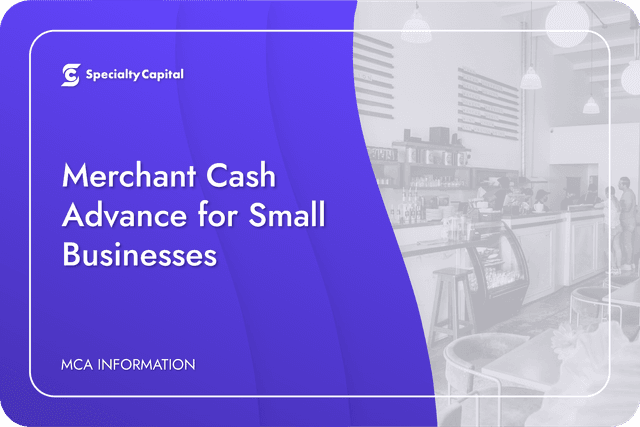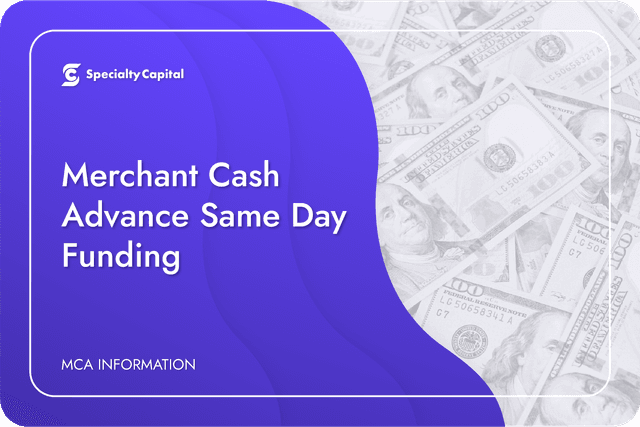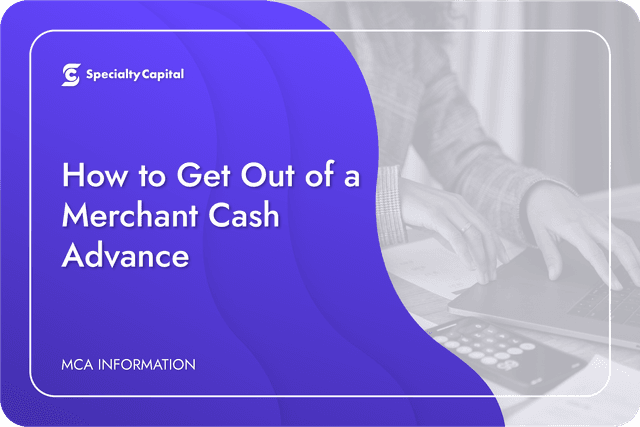When small businesses need financing, they have a range of financing options to choose from. But many opt for a merchant cash advance (MCA) because of how fast you can secure financing.
In this article, we’ll discuss the reasons why MCAs are great for small businesses, what they can be used for, and how to get approved.
One of the most attractive aspects about merchant cash advances is you can secure one in as little as 24 hours. These merchant cash advances with same day funding can be a lifesaver for businesses.
The application review process is quick because the funder doesn’t need to do extensive research to determine whether or not funding to you is risky. All they need to see is a suitable history of card sales. If you can show this, you should be able to get the funds you need immediately.
With other financing solutions, it can take weeks or even months to secure the funds you need. For example, conventional financing can take 1-4 weeks to secure, mainly because the funder will have to do thorough research to determine whether or not funding to your business is a good idea. And if you’ve chosen a traditional funder, the process could take even longer.
An SBA loan takes even longer to secure, as there are numerous parties involved in the process, namely you, the funder, and the SBA. Granted, you can secure one of these loans even if you have bad credit or limited business history, but it can take 2-3 months to secure funding — which is too long for many small businesses.
However, an MCA may get your business the funds it needs right away, but you’ll also have to start remittance right away. In some cases, you may need to start remittance in less than a week after you secure funding. And depending on the conditions you get, you may have to remit on a weekly or bi-weekly basis.
You won’t need a high credit score, lengthy business history, or a mountain of business and financial documents to secure an MCA because of how flexible the requirements are. All you need to show is three to six months of card sales. If the volume of card sales and total amount look good, you should get approved for the funds you need right away.
To secure other kinds of financing, you’d need to meet many more requirements. For example, if you were trying to get conventional funding from a traditional funder, you’d have to submit all kinds of business documents and financial statements, and you’d have to prove that your business has been worthy of borrowing for at least two years.
Along with documents that show your card sales history, you’ll need to submit a valid ID, business licenses, tax returns, bank statements, and a few other documents that’ll give the funder an idea of your business’ financial health. Regarding these latter documents, if they look good, it’s more likely that you’ll be able to secure favorable funding conditions.
But don’t take a lack of requirements as a sign that an MCA is not a serious financing solution. Sure, it may be easy to secure, but the funding condition can be pretty strict, especially when it comes to the speed at which remittance must be made.
In the vast majority of cases, you won’t need to put up collateral to secure an MCA. Also, you won’t need to make a down payment.
To secure a conventional funding or an SBA loan, you’d have to put up collateral worth 80%-100% or more of the loan’s value, and you’d need to make a down payment of 10%-30%. With equipment financing, the loan is backed by the equipment purchased, meaning it would be repossessed if you default.
Sometimes MCA funders will ask for collateral, but this is only when they’ve deemed your business to be an especially risky investment. If you can’t put up collateral, you may need to sign a personal guarantee, wherein you agree that the funder has the right to seize and sell your assets in the event of default.
If collateral is required, what you offer up will have to be appraised by the funder before it’s accepted. Usually, personal homes, automobiles, boats, collectibles, and other valuables are used as collateral for a business loan.
There are no use restrictions with an MCA, meaning you can use the funds you receive as you see fit. This isn’t the case with other financing solutions, especially SBA loans. For example, if you get an SBA 504 loan, the funds can only be used to purchase or develop real estate. If you get equipment financing, the funds can only be used to purchase equipment.
Also, with these other financing solutions, it’s clear what the funds CAN’T be used for. For example, you can’t use an SBA 7(a) loan for debt consolidation.
Because there are no use restrictions, you’ll have more peace of mind when using the funds from an MCA, as you won’t have to worry about being saddled with misuse-of-funds penalties.
When you apply for a conventional business loan, your credit score will likely drop immediately afterwards. This is because the funder you chose will have to conduct a hard inquiry to determine your creditworthiness. And if you’re approved, your score may drop again, as this tends to happen when you take on more debt.
But with an MCA, your credit score won’t be negatively impacted at all. Unfortunately, the flip side is that remitting consistently on time won’t boost your credit score.
Many small businesses use the funds from an MCA as working capital. Among other things, working capital is needed to:
Also, if your business gets saddled with a penalty or fine, you’ll need to allocate working capital to cover the cost. This is one instance when funds from an MCA can really come in handy. You can borrow what you need to cover the expense, meaning you won’t have to take money that’s been allocated elsewhere. This way your business can operate as it normally does.
A merchant cash advance can also be used to purchase or develop commercial real estate. Let’s say there’s space available for purchase but it’s not going to be on the market for long. A conventional term loan won’t do because it’ll take at least 1-2 weeks to secure funding. An SBA loan certainly won’t work because it usually takes 2-3 months to secure funding.
But with an MCA, you can get the money almost instantly and use it to make a competitive offer right away. Plus, there are no limitations regarding how you can use the funds, so you can purchase any kind of commercial real estate and develop it as you see fit.
If you can’t secure an equipment funding, get an MCA to purchase the equipment your business needs. You won’t have to worry about high fees or repossession if you do. Also, there won’t be useful life requirements to satisfy, so you’ll be able to purchase new or old equipment.
Plus, if the new equipment helps your company generate more revenue via card sales, you may be able to fulfill it faster than you would if you took out typical equipment funding, meaning you could save a lot of money by purchasing it with an MCA.
If you’re looking to consolidate debt, but bad credit is preventing you from getting favorable conditions on a conventional business term loan, consider using an MCA for debt consolidation. But before you apply for an MCA, make sure you won’t end up remitting more in the long run by consolidating this way.
To calculate how much you’ll save, first estimate how much you’d remit in fees before consolidating with an MCA. Next, compare the figure you got with the amount you’d need to borrow plus factor rates of 1.1-1.5. If an MCA is the cheaper option, secure one and consolidate your debt immediately.
Just like when securing a business loan, determining exactly how much you need to borrow is important, mainly because you don’t want to borrow too much or too little. If you borrow too much, the overall cost of borrowing will be more expensive than it has to be. If you borrow too little, you’ll have to secure more funding later, which may be difficult.
To arrive at the right amount, determine what you need the funding for. Will the funds be used to cover an unexpected expense? Do you need working capital? Are you looking to consolidate debt?
Also, consider the MCA’s size in relation to how long it’ll take to fulfill. If you borrow a significant sum, and your remittance are of small or moderate size, it’ll take you longer to remit the funding.
Finally, determining how much you need will also help you decide on a funder. After all, some funders have a borrowing max, whereas others can fund hundreds of thousands or millions.
Since your card sales history will make or break your application, you need to consider it honestly.
Most MCA funders will ask for three to six months of card sales, and they’ll want to see that your business does considerable card sales volume on a month-to-month basis. They’ll also look at the total amount of revenue generated each month through card sales when determining whether or not to finance the funds you’re asking for.
Along with documents which show your history of card sales you should also include income statements, bank statements, P&L statements, tax returns, licenses, and other important business financial documents with your application. These extra documents will help the funder reach a decision, and they may help you secure better funding condition if everything looks good.
Lastly, it’s important to have all required and supplementary documents ready to go before you submit your application. This way the review process isn’t elongated because of missing documentation.
While it’s tempting to go with the first MCA funder you come across, you should check out a handful of options before deciding on a funder to fill out an application with.
And when you’re comparing funders, consider potential funding condition, specifically those relating to factor rates and remittance schedules.
If you’re looking for an MCA funder, Specialty Capital can help you get the best rates and conditions possible. Get in touch with us today to secure the financing you need!
Once you’re clear on how much you want to borrow and what you’ll be using the MCA for, fill out an application with the funder that’s most likely to give you the best deal.
The majority of MCA funders accept applications online, but you may be able to submit one in person or over the phone. That said, check with the funder you’ve chosen beforehand to see what their preferred method of submission is. This way you don’t delay the review process.
If your application is approved, the funder will send over a funding agreement for you to review and sign. You should review the proposed agreement at least twice before signing. If you’re unclear about anything in the agreement, reach out to the funder for clarification.
Still have questions after speaking with the funder? Consider hiring a business attorney who specializes in finance agreements to go over the document with you. Once everything is clear, sign the agreement.
Upon receiving confirmation that you’ve signed, the funder will begin the disbursement process. How long it takes to get your funds depends on the funder you choose, but in most cases it takes just 24 hours to secure funds from an MCA.
Yes, you can secure a merchant cash advance even if you have bad credit, or a personal credit score below 500 and a PAYDEX score below 49. This is one of the notable ways in which MCAs are different from other financing solutions. With a term loan, for example, you’d often need a personal credit score of 680 or higher and a PAYDEX score of 80 or higher to get approved.
Your credit scores aren’t the end-all be-all to MCA funders because they’re more concerned with your business’ ability to generate revenue via card sales.
However, your credit scores won’t be totally irrelevant when the funder you’ve chosen is considering your application. If you have good credit, it’s more likely that you’ll be able to secure favorable funding condition, namely a lower factor rate. If your credit is poor, and your business’ financials look shaky, chances are your MCA will be more expensive.
Also, taking out an MCA won’t negatively impact your credit scores at any point. Compare this with other financing solutions, where just the simple act of applying can reduce your scores by several points. Of course, the flip side here is that remitting on time won’t boost your credit scores as it would with other forms of financing.
The only time an MCA will impact your credit scores is if you default. Should this happen, you can expect your credit scores to go down sharply. For example, your personal credit score may go down 50 points or more. The good news here is that defaulting on an MCA is fairly uncommon. In fact, this only happens if your business doesn’t generate any revenue for weeks.
If your small business is looking to get financing fast and with minimal hassles, consider getting a merchant cash advance. You can get funding in as little as 24 hours, you won’t need to meet strict requirements to get approved, and you can use the funds however you like.
Additionally, you won’t need to put up collateral to secure an MCA, and taking one out won’t negatively affect your personal and business credit scores. You can also explore several MCA alternatives to get a better understanding of all of the business financing options available.

Merchant Cash Advance for Small Businesses (Benefits & Requirements)
When small businesses need financing, they have a range of financing options to choose from. But many opt for a merchant cash advance (MCA) because...

Merchant Cash Advance Same Day Funding
A merchant cash advance (MCA) is a great financing option when you need same-day funding, but there are certain requirements, restrictions, and dra...

How to Get out of a Merchant Cash Advance
A merchant cash advance (MCA) can be great when you need short-term financing that’s easy to secure, but what happens if you want to get out of an ...